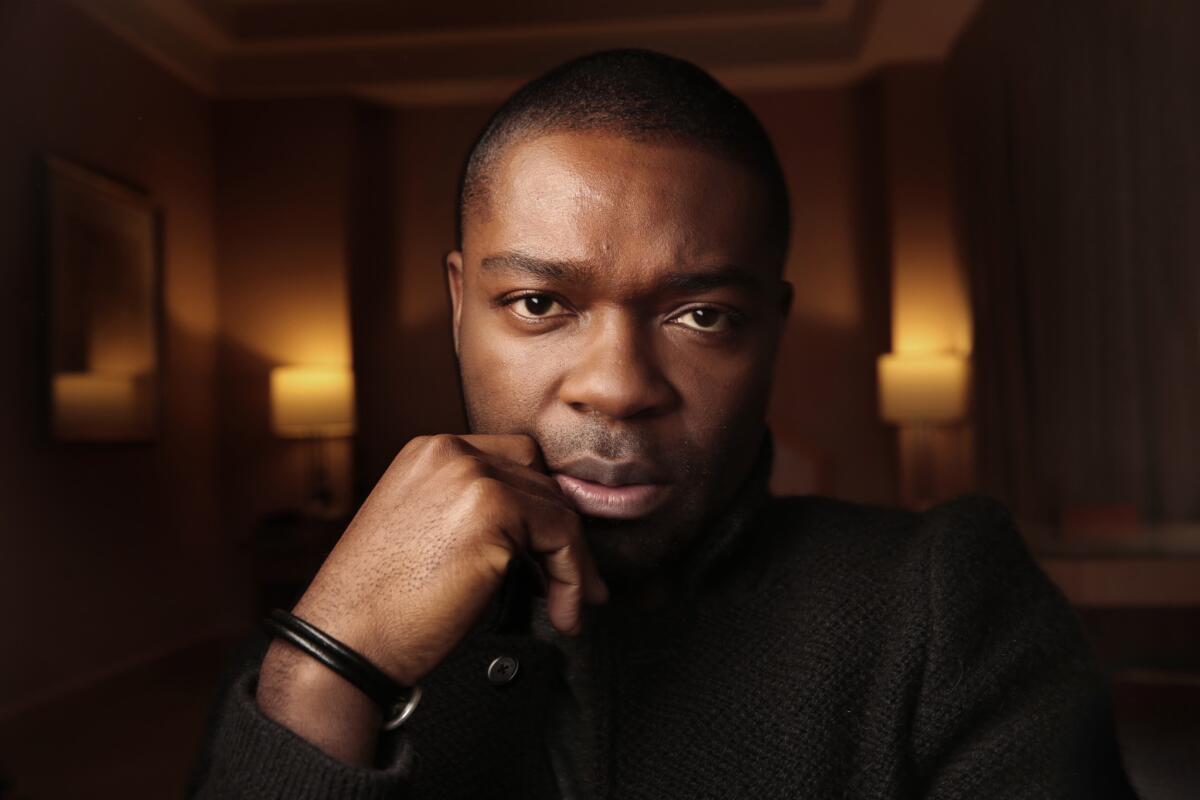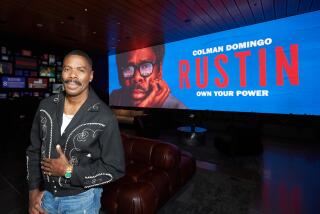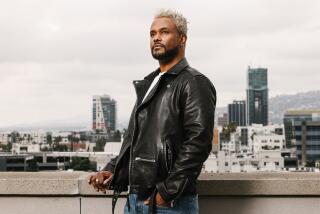In ‘Selma,’ David Oyelowo digs deep to play Martin Luther King Jr.

Shortly before the actor David Oyelowo began shooting the part of Martin Luther King Jr. in the new historical drama “Selma,” he set out on a video-hunting mission. Oyelowo was searching for something that would help him get under the skin of his subject — that would go beyond the polished statue of photo ops and speech clips — when the longtime King ally Andrew Young handed him a piece of unseen footage.
In it, the civil rights leader could be viewed letting his guard down with friends and allies as they barnstormed on a campaign of economic equality; the candid material, it turns out, was shot just weeks before King was gunned down.
“When Dr. King was being interviewed by the press, there was a certain demeanor, a dignified presence, he felt the need to project,” said the Nigerian-British Oyelowo, in a plummy accent. “But with this, he was just there, not putting on any of that — eating fried chicken, belching, laughing with his friends, being the prankster, the guy’s guy. And that was huge for me. It was finally a chance to see the man behind the iconography.”
Exploding like a Roman candle into the nationwide protests over police shootings of unarmed black men, “Selma” eschews the cradle-to-grave conventions of a biopic in favor of something more fresh, specific and timely.
Director Ava DuVernay’s film centers on three critical and bloody months in 1965 when King and other civil rights leaders sought to organize a Selma-to-Montgomery march in segregated Alabama. Weeks before its Christmas Day release, the movie had already become both an awards contender and a social-rallying cry.
By focusing tightly on King’s approach — which involved drawing attention to the cause with media-friendly incidents that, he hoped, would galvanize President Johnson to press for the Voting Rights Act — “Selma” is as interested in strategies as speeches. In so doing, the film etches a King who’s engaging in monumental work without treating him like a monument.
For the first major film ever to feature King as a lead character, moviegoers get a different civil rights leader than they might be familiar with. Oyelowo plays King with a wide range of modes-- an oratorical gravitas in key sermons, yes, but also a quiet defeatism when confronted by his wife about infidelity and a scrappy fighting spirit in backroom church planning sessions.
They also get a different kind of actor by which to experience those moments. The 38-year-old Oyelowo (pronounced as it’s spelled, which doesn’t make it any easier to say) is a performer with outspoken views on race and Hollywood; a debonair Oxford native with a very different background than the Atlanta-raised pastor he’s bringing to life; and a man with such a strong spiritual bent he says he believed God chose him to play this role.
On a recent morning, Oyelowo was in a hotel restaurant here, the latest stop on a tour that has him crisscrossing the country in a manner not unlike his cinematic counterpart. If the putative reason--holiday film promotion--is not as serious, the cause is. The tour offers a chance for Oyelowo and other “Selma” principals to stand up at word-of-mouth screenings and talk about both injustice and means of nonviolent response--the stuff that’s simultaneously playing out on the screen and outside the theater walls.
“We wrapped the second of July, and Michael Brown was killed on the ninth of August,” Oyelowo said. “I’m at one screening and I’m standing there 30 minutes after the verdict that Darren Wilson wasn’t going to be indicted in Ferguson. People watching this film think we made it after Ferguson. King was cut down because they knew what impact his message would have and how it would completely change this country, and here we are with this movie able to talk his strategy of love in the face of hate.”
Oyelowo said to convey that message he sought to pull back the curtain, a kind of inspiration through demystification.
“What’s this guy like at home with his wife and kids?” Oyelowo said. “He’s not talking in a vibrato about taking out the trash. Where are his doubts, his guilt, his need to walk away? Those are the reasons to do a film about Dr. King. Because otherwise, there is documentary footage and books. You don’t need this movie.”
At the same time, Oyelowo said, he wanted to avoid the mannerisms and others tics of fact-based acting. “What I tried to do was embody, not do an impersonation or an impression.”
That approach appears to be working for those best suited to judge — the people who knew and studied King. When the long-serving Congressman John Lewis (D-Ga.), one of the so-called Big Six leaders who was also instrumental in Selma, came to the film’s Atlanta set one day, he sat in the back of a church and found himself conflating a real past with a constructed present. King, he believed, was preaching in front of him.
“When they stopped filming, I walked up to David and hugged him, and we both started crying,” Lewis said. “Everyone around us thought we lost our minds.” (The movie, incidentally, is not officially endorsed by the King family, though various members have been supportive. Filmmakers didn’t license King’s speeches; the oratory, including a piece de resistance on the Montgomery Country Capitol steps, were written by the filmmakers.)
DuVernay said she would find herself doing double-takes in the edit room watching Oyelowo footage.
“I would look at some of the stuff he was doing, and there didn’t seem to be a shred of David in it except his body, and even that changed,” she said, alluding both to the actor’s movements and added weight that more closely resembled King than the compactly built actor.
Martin Luther King III, who bears his own similarities to his father, offered perhaps the most potent endorsement. “He was able to capture the essence of Dad.”
Whether that means Oyelowo will be entirely embraced by audiences is another matter. Playing an icon can be a dangerous game: You enjoy the benefit of filmgoers coming in with a built-in sense of reverence, but you also have to live up to a fixed idea in their minds (or worse, run the risk of seeming like you’re trying too hard to replicate it).
Oyelowo will at least have the benefit of few preconceptions. The actor, who lives in Los Angeles with his wife and four children, has had plenty of work that hasn’t fully registered with the moviegoing public — as James Franco’s boss in “Rise of the Planet of the Apes,” as Forest Whitaker and Oprah Winfrey’s son in “Lee Daniels’ The Butler.” This season he’s also a complicated prosecutor in J.C. Chandor’s “A Most Violent Year” and can be seen in an early scene in “Interstellar” as part of a duo explaining to Matthew McConaughey that space exploration was a Cold War myth.
Oyelowo first read Paul Webb’s “Selma” script in 2007. The movie took a wide path to the screen; despite producers who included Brad Pitt and eventually Winfrey, versions with Steven Spielberg, Paul Greengrass and Lee Daniels all failed to get off the ground, until Oyelowo helped bring on DuVernay last year. (The film was financed independently in part via the French sales company Pathe; Paramount came aboard later to distribute it.) Despite being virtually unknown seven years ago, Oyelowo, a devout Christian who will often pray on sets, said he heard a voice tell him that he would play the role.
“I knew that voice, because it was the same voice that told me to marry my wife, the same voice that told me to give names to my children before they were even conceived,” he recalled. “This is how God has spoken to me in the past. And it’s what kept me going even though directors at the time didn’t want me.”
When he headed to Daniels’ room at the Chateau Marmont to audition several years ago when the director was still on the project, the voice made itself audible again.
“I heard God say to me, ‘Don’t have your bag on your shoulder but on your side, because that’s how Dr. King would have it.’” When Oyelowo walked into the room, he recalled, Daniels remarked that he thought King himself had entered. Winfrey, in an email, said, “I could sense from David a level of humility and a level of pure passion and desire to honor his calling. The calling beyond just being an actor, but his calling as a human being, to honor what God had put him here to do.”
The actor’s strong beliefs and outspoken manner are manifest in other ways.
At a small dinner thrown by Paramount in October, Oyelowo, talking about the struggles of minorities in the movie business, described to several reporters how he felt black actors needed to band together more, saying that “Jewish Hollywood wouldn’t be what it is without a certain amount of nepotism.”
He took a more circumspect approach when asked about the comment in the recent conversation. “The truth of the matter is we want to see ourselves in movies,” he said. “I guess what I was alluding to is that if we have enough people who have a power base, then we don’t need to wait for our story to be told. And a power base comes from a unified front. Nothing feels more quintessentially Hollywood than seeing George Clooney and Matt Damon and Ben Affleck on the red carpet and they’re all working on each other’s movies.”
He continued, “I think we’ve been sold a lie that there can only be ‘one,’ that the question with any black actor is ‘is he the next Denzel?’ Zac Efron isn’t subjected to that. Channing Tatum isn’t subjected to that. And if [a black actor] makes the mistake of buying into it, he can be isolated and picked off.”
The issue, he added, is the quality of parts as much as the quantity of performers. “It needs to be more than just roles like Martin Luther King, more than just roles we get to play because Ryan Gosling literally can’t play them.”
He paused and gave a small laugh. “What I’m saying is we need to steal a few from Ryan Gosling.”
More to Read
Only good movies
Get the Indie Focus newsletter, Mark Olsen's weekly guide to the world of cinema.
You may occasionally receive promotional content from the Los Angeles Times.







